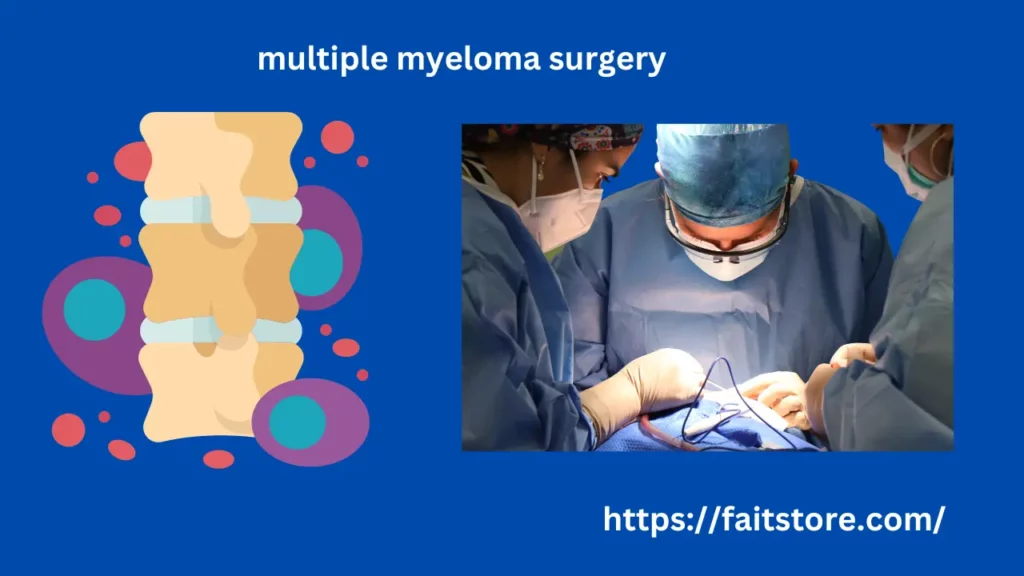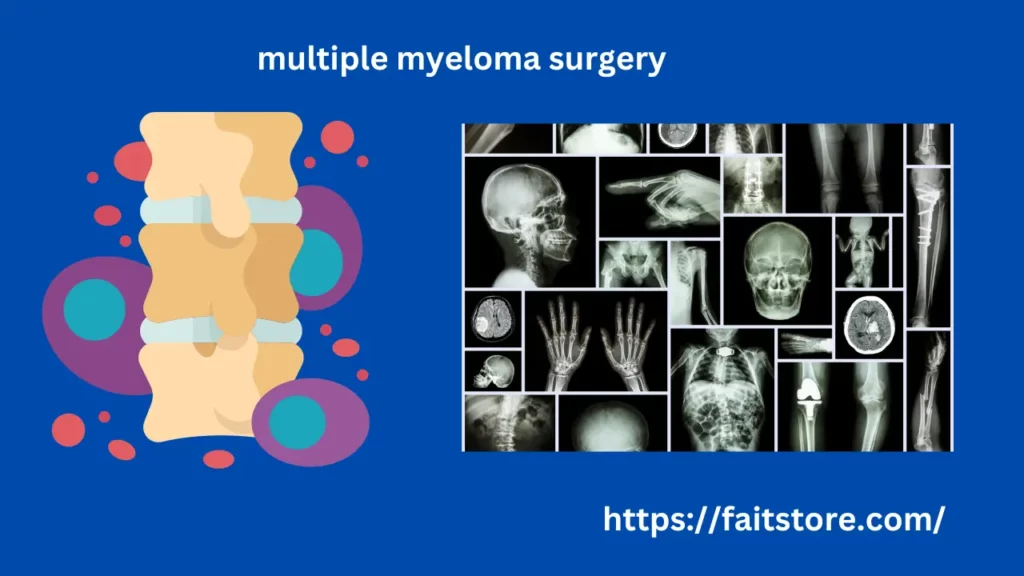
multiple myeloma surgery
Introduction
Living with multiple myeloma can be challenging, but advancements in medical science have brought forth various treatment options, with surgery playing a crucial role in the management of this condition.Multiple Myeloma Surgery
Understanding Multiple Myeloma
Causes and Risk Factors
Multiple myeloma develops when plasma cells in the bone marrow become cancerous, leading to the overproduction of abnormal antibodies. Risk factors include age, family history, and exposure to certain chemicals.Multiple Myeloma Surgery

Common Symptoms
Patients may experience bone pain, fatigue, and recurrent infections. Early diagnosis is vital for effective management.
Diagnosis and Staging
Accurate diagnosis involves blood tests, imaging studies, and bone marrow biopsy. Staging helps determine the extent of the disease.Multiple Myeloma Surgery
Treatment Options
Role of Surgery in Multiple Myeloma
Surgery is often a crucial component of a multidisciplinary approach to treating multiple myeloma. While not a standalone cure, it aids in alleviating symptoms and improving quality of life.Multiple Myeloma Surgery

Other Treatment Modalities
Apart from surgery, patients may undergo chemotherapy, radiation therapy, and immunotherapy tailored to their specific condition.
Multidisciplinary Approach
Collaboration between oncologists, haematologists, and surgeons ensures a comprehensive treatment plan addressing various aspects of the disease.
Types of Surgeries
Bone Marrow Transplant
This procedure involves replacing damaged bone marrow with healthy stem cells, promoting the regeneration of normal blood cells.
Plasmapheresis
Plasmapheresis is a technique where harmful antibodies are removed from the blood, reducing complications associated with myeloma.
Surgical Interventions
Surgeons may perform procedures to remove tumours or repair bones affected by myeloma, enhancing the patient’s overall well-being.
Preparing for Surgery

Patient Education
Empowering patients with knowledge about the surgical process and expected outcomes is crucial for informed decision-making.
Consultation and Evaluation
Thorough assessments by the healthcare team ensure patients are physically and emotionally prepared for surgery.
Emotional Support
Addressing the emotional aspect is paramount, and providing support through counselling or support groups can make a significant difference.Multiple Myeloma Surgery
Surgical Procedures
Bone Marrow Biopsy
This common diagnostic procedure helps determine the extent of bone marrow involvement and guides treatment decisions.
Tumor Resection Techniques
Surgeons employ various techniques to remove tumours, preserving as much healthy tissue as possible.Multiple Myeloma Surgery
Potential Complications
While surgeries are generally safe, understanding potential complications like infection or bleeding is essential for both patients and caregivers.
Recovery and Rehabilitation
Postoperative Care
Diligent postoperative care includes pain management, monitoring for complications, and providing support during the recovery phase.
Rehabilitation Programs
Physiotherapy and rehabilitation programs contribute to restoring functionality and improving overall quality of life.
Long-Term Management
Regular follow-ups with the healthcare team are essential for monitoring progress and addressing any emerging issues.
Benefits and Risks

Positive Outcomes
Surgery can provide relief from symptoms, enhance mobility, and contribute to an improved overall quality of life for myeloma patients.
Potential Complications and Side Effects
While rare, complications may include infection, bleeding, or adverse reactions to anaesthesia. Thorough preoperative assessments mitigate these risks.
Patient Stories
Real-Life Experiences
Hearing from individuals who have undergone myeloma surgery provides valuable insights into the challenges and triumphs associated with the process.
Positive Impact of Surgery
Many patients report significant improvements in their daily lives, emphasizing the positive impact of surgery on their myeloma journey.
Research and Advancements
Current Studies and Trials
Ongoing research aims to enhance surgical techniques, reduce side effects, and explore innovative approaches to managing multiple myeloma.
Future Prospects in Myeloma Surgery
The future holds promise with advancements such as targeted therapies and personalized treatment plans, offering hope to those affected by myeloma.
Collaborative Care
Role of Healthcare Team
Close collaboration between specialists ensures a holistic approach, addressing the unique needs of each myeloma patient.
Patient and Caregiver Involvement
Active participation in decision-making empowers patients and caregivers, fostering a sense of control in their myeloma journey.
Lifestyle Changes
Diet and Nutrition
A well-balanced diet supports overall health, aiding in the recovery and management of multiple myeloma.
Physical Activity
Tailored exercise programs contribute to improved strength, flexibility, and mental well-being.
Stress Management
Mind-body techniques and stress-reducing activities play a role in enhancing the overall quality of life for myeloma patients.
Support Groups
Importance of Peer Support
Connecting with others facing similar challenges provides a support network, reducing feelings of isolation.
Online and Local Communities
Virtual and local support groups offer a platform for sharing experiences, resources, and emotional support.
Insurance and Financial Considerations
Coverage for Myeloma Surgery
Understanding insurance coverage and exploring financial assistance programs can ease the financial burden associated with myeloma treatment.
Financial Assistance Programs
Several organizations offer financial assistance to help offset the costs of myeloma surgery and related treatments.
What is the most successful treatment for multiple myeloma?
The treatment landscape for multiple myeloma is diverse, and the most successful approach often depends on individual factors such as the patient’s overall health, the stage of the disease, and specific genetic characteristics. However, recent advancements in medical science have made certain treatments particularly effective in managing multiple myeloma.
One of the key components in treating multiple myeloma is chemotherapy, which uses drugs to target and kill cancer cells. Immunomodulatory drugs (IMiDs) and proteasome inhibitors are commonly used in combination with chemotherapy, enhancing its effectiveness.
Another significant breakthrough in multiple myeloma treatment is the advent of targeted therapies. chemotherapy.
For eligible patients, stem cell transplantation, particularly autologous stem cell transplant, has shown success. This procedure involves harvesting the patient’s healthy stem cells, administering high-dose chemotherapy to eliminate cancer cells, and then reintroducing the healthy stem cells to restore the bone marrow. also demonstrated efficacy in treating multiple myeloma. These antibodies work by targeting specific proteins on the surface of myeloma cells, enhancing the immune system’s ability to recognize and eliminate them.
Additionally, ongoing clinical trials and research continue to explore novel treatments, including CAR T-cell therapy and other immunotherapies, offering promising avenues for the future.Multiple Myeloma Surgery
Individuals with multiple myeloma must consult with their plan based on their unique circumstances. Treatment decisions are often made through a collaborative effort involving oncologists, haematologists, and other specialists to ensure a comprehensive and personalized approach to managing multiple myeloma.
Conclusion
In the journey through multiple myeloma, surgery stands as a valuable ally, contributing to symptom relief and improved quality of life. Embracing a multidisciplinary approach, patients can navigate this challenging terrain with resilience and hope.Multiple Myeloma Surgery

FAQs:Multiple Myeloma Surgery
- Is surgery the only treatment option for multiple myeloma?
- No, surgery is often combined with other treatments like chemotherapy and radiation therapy for comprehensive management.
- What are the potential complications of myeloma surgery?
- Complications can include infection, bleeding, or adverse reactions to anaesthesia, but these are rare and thoroughly managed.
- How long does the recovery process typically take after myeloma surgery?
- Recovery times vary, but postoperative care and rehabilitation programs contribute to a smoother recovery.Multiple Myeloma Surgery
- Are there alternatives to traditional myeloma surgery?
- Yes, emerging technologies and targeted therapies offer alternative approaches to traditional surgical interventions.
- How can patients find support during their myeloma journey?
- Support groups, both online and local, provide a valuable platform for sharing experiences and gaining emotional support.






